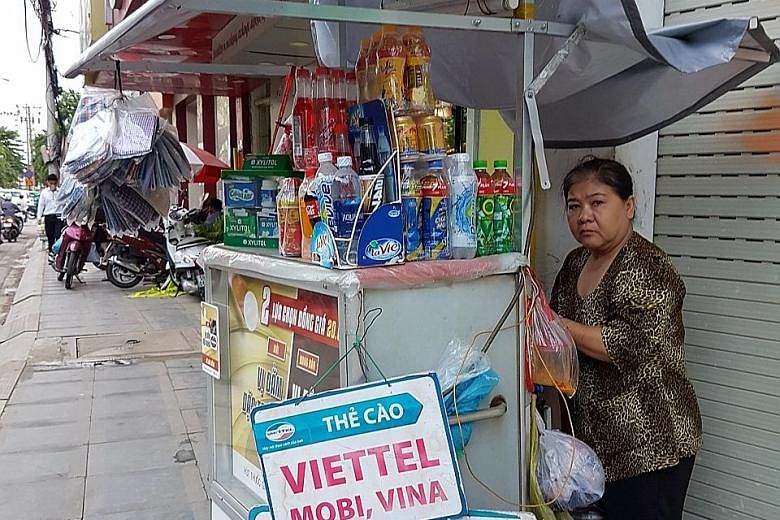In the arrival hall of Ho Chi Minh City airport, a group of travellers crowded around a kiosk are trying to decide which mobile phone carrier to subscribe to.
A sales assistant fishes out a brochure listing prices of SIM cards packaged with various prepaid services. SIM cards and Vietnamese dong change hands swiftly and anonymously.
Security concerns are prompting regional governments to tighten regulations on SIM cards, but these remain easy to get.
While Myanmar, Thailand, Cambodia and Vietnam have ordered retailers to collect more personal information from those buying SIM cards - and even shut down the accounts of unregistered ones - SIM cards continue to be sold in many places with few questions asked.
The clampdowns are taking place as people increasingly shop and bank with their mobile phones. Meanwhile, migrants, low-income workers and travellers continue to sustain the sales of prepaid "disposable" SIM cards that are topped up when needed, making enforcement a challenge.
Hanoi decreed that mobile line subscribers would have to provide photos of themselves from April, on top of a copy of their identification card. Cambodia, which has been trying to enforce a 2012 circular banning the use of unregistered SIM cards, arrested a man in February for selling SIM cards without collecting users' information.
Myanmar set a March deadline for the registration exercise, though a check by The Straits Times check in Yangon last month found anonymous purchases a breeze.
In Thailand, where identity checks are already the standard among retailers, the telecommunications regulatory authorities announced in May that anyone buying prepaid SIM cards in the restive southern region will need to have their fingerprints and digital photographs verified against a central database. This will be extended nationwide next year.
Separatist insurgents in Thailand's southern border provinces regularly set off improvised explosive devices - many with mobile phones - in their attacks on state security forces. The conflict has killed more than 6,000 people since 2004. Elsewhere in Thailand, mobile phones were also used to detonate a string of blasts in August last year in tourist destinations like Hua Hin and Phuket, killing four people.
Thailand's National Broadcasting and Telecommunications Commission (NBTC) said more than 10,000 new registrations were made so far, with the existing 30 biometric data devices being tested. By next month, it plans to push out about 20,000 such devices to retailers nationwide.
"SIM cards are used by many insurgents to trigger bombs," NBTC secretary-general Takorn Tantasith told The Straits Times. "Preventing their use would prevent further loss of lives and destruction of property."
Not all bomb mechanisms are made using mobile phones. But Singapore-based counter-terrorism expert Yaniv Peretz told The Straits Times that terrorists like to use mobile phones in bombs because it enables them to trigger explosions "from big distances". There are measures to tackle this threat, he said.
On the flip side, tightening SIM card regulation has triggered concern among privacy advocates that user data may be misused or stolen.
When asked about this, Norwegian telecommunications firm Telenor, which has operations in Malaysia, Myanmar and Thailand, said it "follows strict and transparent policies" when responding to government requests for information "to limit risks of illegitimate restrictions on privacy and freedom of expression".
Meanwhile, the recent discovery of a "click farm" in Thailand has underscored how SIM cards can be abused for other underground activities. Last month, Thai police arrested three Chinese nationals in a rented room by the Cambodian border with some 500 smartphones and more than 300,000 SIM cards. They told police they had been hired by product owners to generate "likes" for their wares on the China-based WeChat social network - a tactic often used to attract buyers online.
In a market just outside Bangkok last week, a vendor sold a SIM card to a customer who could not produce an identification card - but not without taking a picture.
"If you use this card to commit a crime, I have your picture," she warned.

